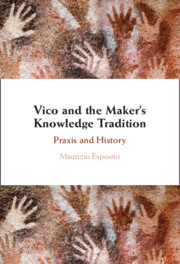Refine search
Actions for selected content:
179 results
Conclusion: Re-sizing Worlds
-
- Book:
- Entanglements in World Politics
- Published online:
- 27 November 2025
- Print publication:
- 11 December 2025, pp 309-357
-
- Chapter
-
- You have access
- Open access
- HTML
- Export citation
Prophets, Plumbers, and Philosophers: A Pragmatic Argument for Public Philosophy
- Part of
-
- Journal:
- Public Humanities / Volume 1 / 2025
- Published online by Cambridge University Press:
- 03 December 2025, e171
-
- Article
-
- You have access
- Open access
- HTML
- Export citation
A Report on Knowledge: Written Reports from the Church of England, 1985–Present
-
- Journal:
- Journal of Anglican Studies , First View
- Published online by Cambridge University Press:
- 18 November 2025, pp. 1-23
-
- Article
- Export citation
Chapter 8 - The Pragmatic and the Religious Functions of Science
- from Part II - Inspirations
-
-
- Book:
- Science and Humanism
- Published online:
- 09 October 2025
- Print publication:
- 23 October 2025, pp 172-194
-
- Chapter
-
- You have access
- Open access
- HTML
- Export citation
13 - Broader Lessons from the Regulation of Beer
-
- Book:
- Beer Law
- Published online:
- 26 September 2025
- Print publication:
- 16 October 2025, pp 202-215
-
- Chapter
- Export citation
1 - Introduction
-
- Book:
- Representing Future Generations
- Published online:
- 19 September 2025
- Print publication:
- 09 October 2025, pp 1-20
-
- Chapter
- Export citation
9 - Conclusion
- from Part III - Case Studies
-
- Book:
- Representing Future Generations
- Published online:
- 19 September 2025
- Print publication:
- 09 October 2025, pp 220-232
-
- Chapter
- Export citation
21 - Self and Experience
- from Part IV - Body, Emotion, Self, and Experience
-
-
- Book:
- The Cambridge Handbook of Psychological Anthropology
- Published online:
- 22 October 2025
- Print publication:
- 25 September 2025, pp 505-528
-
- Chapter
- Export citation
1 - Risk, Uncertainty, and the Demand for Political Innovation
-
- Book:
- Insuring States in an Uncertain World
- Published online:
- 13 August 2025
- Print publication:
- 18 September 2025, pp 7-19
-
- Chapter
- Export citation
‘The Conduct of Inquiry’ in ontological security studies: scientific methodologies and their implications
-
- Journal:
- International Theory , First View
- Published online by Cambridge University Press:
- 15 September 2025, pp. 1-31
-
- Article
-
- You have access
- Open access
- HTML
- Export citation
American Pragmatism, the Frankfurt School, and the future of Critical International Relations Theory
-
- Journal:
- Review of International Studies , First View
- Published online by Cambridge University Press:
- 01 September 2025, pp. 1-20
-
- Article
-
- You have access
- Open access
- HTML
- Export citation

Insuring States in an Uncertain World
- Towards the Collaborative Government of Complex Risks
-
- Published online:
- 13 August 2025
- Print publication:
- 18 September 2025

Data Rights in Transition
-
- Published online:
- 08 August 2025
- Print publication:
- 04 September 2025
-
- Element
- Export citation
Chapter 5 - Praxis Epistemology II
-
- Book:
- Vico and the Maker's Knowledge Tradition
- Published online:
- 27 June 2025
- Print publication:
- 17 July 2025, pp 149-184
-
- Chapter
- Export citation

Vico and the Maker's Knowledge Tradition
- Praxis and History
-
- Published online:
- 27 June 2025
- Print publication:
- 17 July 2025
Chapter 1 - Being and Time as a Whole: From Pragmatism, to Existentialism, to a Philosophy of Being, via the Good
-
-
- Book:
- Heidegger's <i>Being and Time</i>
- Published online:
- 28 June 2025
- Print publication:
- 26 June 2025, pp 7-30
-
- Chapter
- Export citation
Chapter 22 - Conclusion
-
-
- Book:
- On Discovery
- Published online:
- 05 May 2025
- Print publication:
- 22 May 2025, pp 265-289
-
- Chapter
- Export citation
1 - Introduction
- from Part I - Foundations
-
- Book:
- Natural Property Rights
- Published online:
- 17 April 2025
- Print publication:
- 24 April 2025, pp 3-32
-
- Chapter
- Export citation
6 - Becoming Salafi
- from Part II - Asserting Agency in Faith
-
-
- Book:
- The Cambridge Companion to Women and Islam
- Published online:
- 12 April 2025
- Print publication:
- 17 April 2025, pp 151-173
-
- Chapter
- Export citation
Normativity in practice: Ordering through enactment, learning, and contestation in global protests
-
- Journal:
- Review of International Studies / Volume 51 / Issue 5 / September 2025
- Published online by Cambridge University Press:
- 10 April 2025, pp. 800-819
- Print publication:
- September 2025
-
- Article
-
- You have access
- Open access
- HTML
- Export citation
